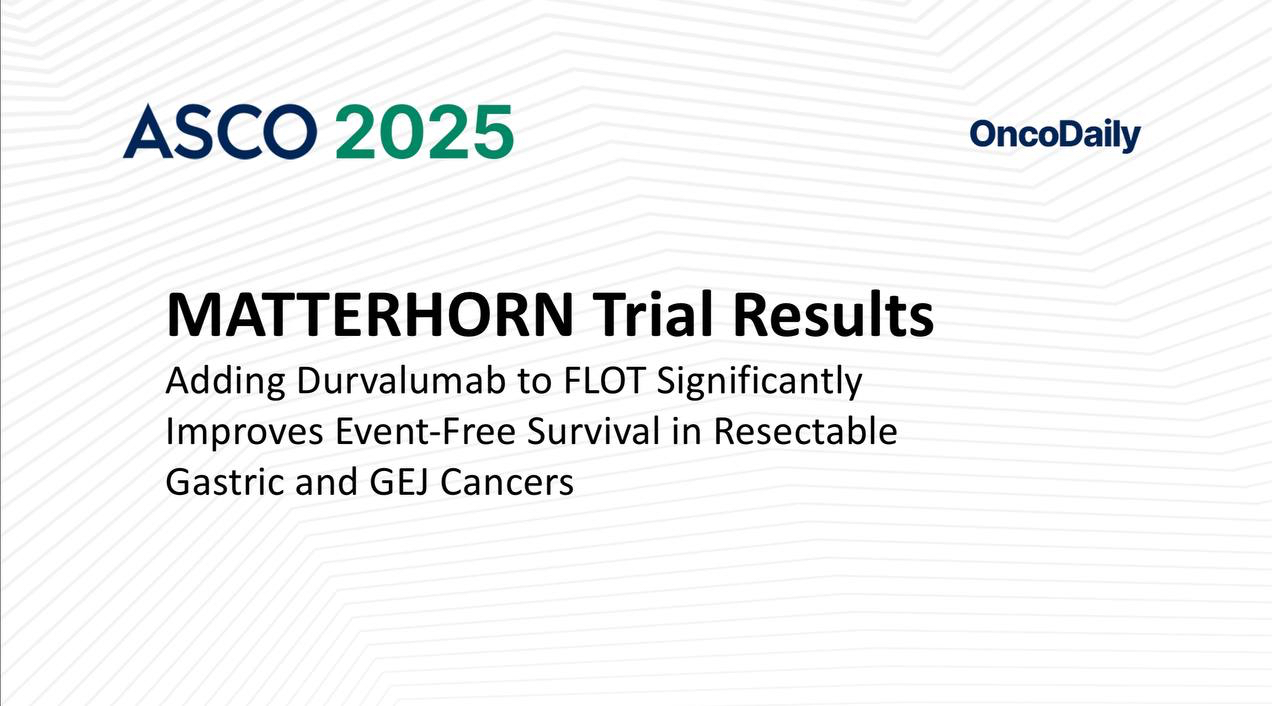At ASCO 2025 Plennary Session, MATTERHORN trial results were presented by Dr. Yelena Janjigian, from MSK, demonstrating a statistically significant improvement in event-free survival (EFS) with durvalumab plus FLOT chemotherapy compared to FLOT alone in patients with resectable gastric and gastroesophageal junction cancer (GC/GEJC). These findings mark a major advancement in the perioperative treatment landscape, suggesting a potential shift in the global standard of care.
Background
Gastric and gastroesophageal junction adenocarcinomas remain aggressive malignancies, with high recurrence rates even after curative-intent surgery. The current perioperative standard of care, FLOT (5-fluorouracil, leucovorin, oxaliplatin, docetaxel), has improved outcomes, yet many patients relapse due to micrometastatic disease. Immune checkpoint inhibitors, particularly PD-1/PD-L1 inhibitors, have shown efficacy in the metastatic setting and are approved in combination with chemotherapy for advanced GC/GEJC. However, their role in the perioperative context remained undefined—until the MATTERHORN trial.
The MATTERHORN trial is investigating the addition of durvalumab, an anti-PD-L1 antibody, to FLOT in patients with resectable, locally advanced GC/GEJC. A previous report from the trial revealed a significant improvement in pathologic complete response (pCR) with the durvalumab-based regimen. The new interim analysis presented at ASCO 2025 builds on this foundation by reporting EFS as the primary endpoint.

Study Design
The MATTERHORN trial was a global, randomized, phase 3, double-blind study enrolling 948 patients with resectable, previously untreated, histologically confirmed gastric or gastroesophageal junction adenocarcinoma (Stage II–IVa, per AJCC 8th edition). Patients were randomly assigned in a 1:1 ratio to receive either durvalumab or placebo in combination with perioperative FLOT chemotherapy.
- Arm A: Durvalumab 1500 mg every 4 weeks + FLOT for 4 cyclesD1 and D15 q4w (2 neoadjuvant, 2 adjuvant) → durvalumab maintenance for 10 additional cycles
- Arm B: Placebo + FLOT → placebo maintenance
Patients were stratified by geographic region (Asia vs non-Asia), clinical lymph node status (positive vs negative), and PD-L1 tumor area positivity (≥1% vs <1%). The primary endpoint was event-free survival (EFS). Key secondary endpoints included pathologic complete response (pCR), overall survival (OS), and safety.

Methods
Patients aged ≥18 years were enrolled and underwent perioperative therapy as outlined. EFS was defined as the time from randomization to disease progression, local/distant recurrence, or death. Efficacy was assessed using RECIST v1.1 criteria, with events adjudicated by blinded independent central review and pathology. The statistical threshold for significance was set at p<0.0239 for this interim analysis.

Results
With a median follow-up of 31.5 months, the MATTERHORN trial met its endpoint with demonstrated statistically significant improvement in EFS:
mEFS in MATTERHORN Trial
- Not reached in durvalumab + FLOT arm (95% CI: 40.7–NR)
- 32.8 months with placebo + FLOT (95% CI: 27.9–NR)
- HR: 0.71 (95% CI: 0.58–0.86), p<0.001
EFS rates
- At 12 months: 78.2% (D + FLOT) vs 74.0% (P + FLOT)
- At 24 months: 67.4% vs 58.5%
Overall survival (interim)
- Median OS not reached in D + FLOT vs 47.2 months in P + FLOT
- HR: 0.78 (95% CI: 0.62–0.97), p=0.025 (OS data 33.9% mature)
Grade 3–4 adverse event rates were comparable between arms. Importantly, durvalumab did not delay surgical resection or initiation of adjuvant therapy.
Key Takeaways
- The MATTERHORN trial is the first global phase 3 study to show a clear EFS benefit with immunotherapy in the perioperative setting for resectable GC/GEJC.
- Durvalumab plus FLOT significantly reduced the risk of recurrence or progression compared to standard FLOT alone.
- OS data are still maturing but show a favorable trend in the immunotherapy arm.
- Safety profile was acceptable, with no new signals or impact on surgical timing.
These data support durvalumab + FLOT as a potential new global standard of care in resectable gastric and gastroesophageal junction adenocarcinoma. With its robust design, global applicability, and clinically meaningful outcomes, the MATTERHORN trial sets a new benchmark for the integration of immunotherapy into early-stage gastric cancer care.

You can Read the Full Article in NEJM
Summary by Amalya Sargsyan, MD

